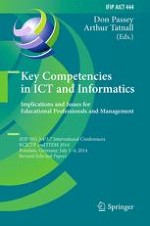2014 | Buch
Key Competencies in ICT and Informatics. Implications and Issues for Educational Professionals and Management
IFIP WG 3.4/3.7 International Conferences, KCICTP and ITEM 2014, Potsdam, Germany, July 1-4, 2014, Revised Selected Papers
herausgegeben von: Don Passey, Arthur Tatnall
Verlag: Springer Berlin Heidelberg
Buchreihe : IFIP Advances in Information and Communication Technology
